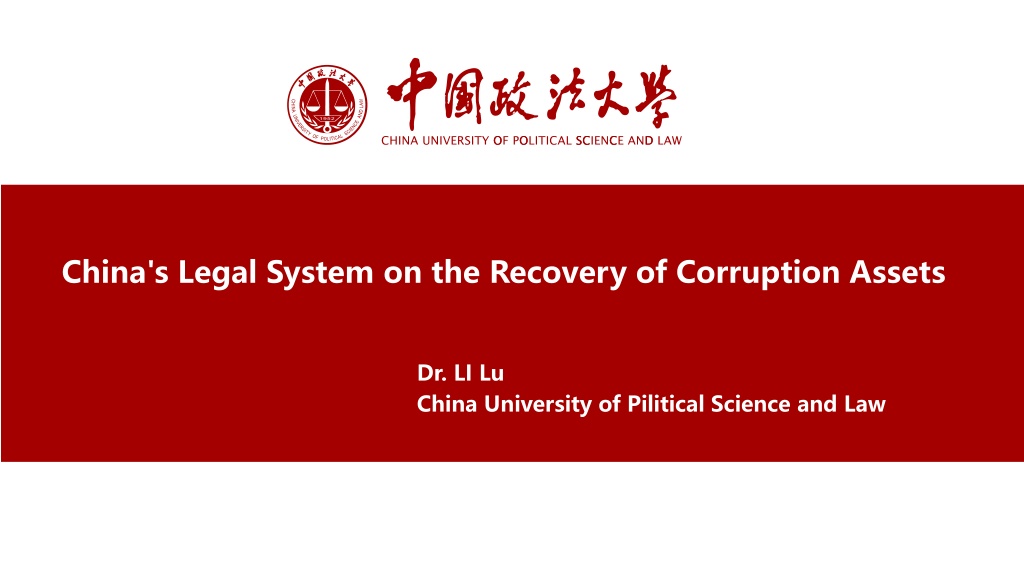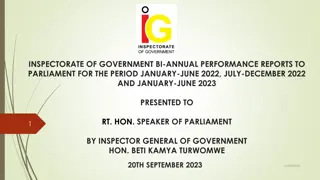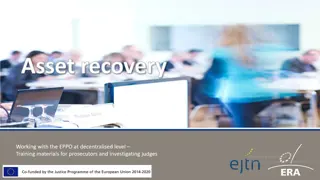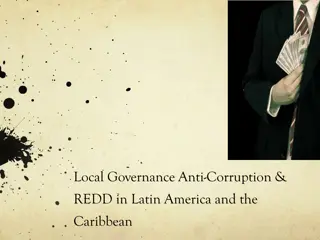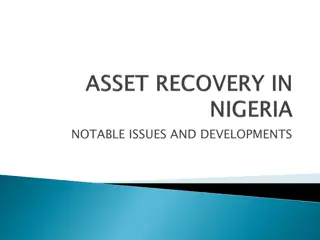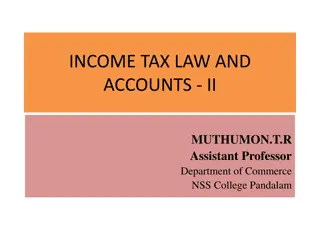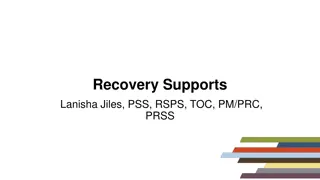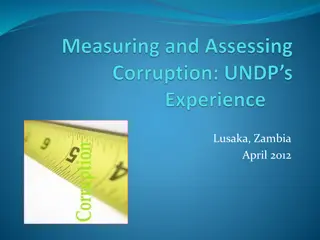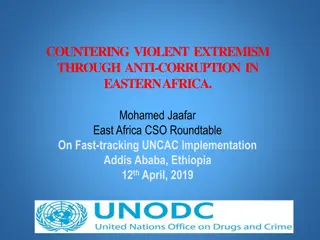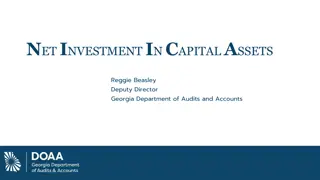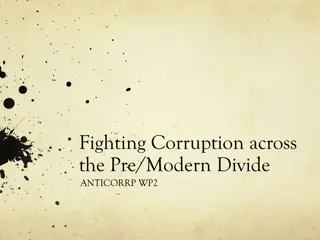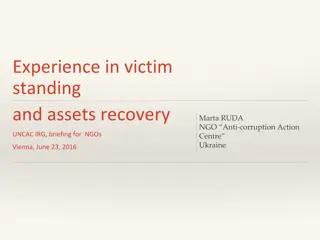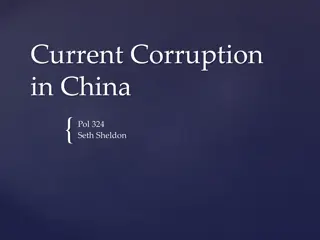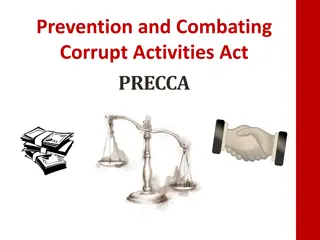China's Legal System on Recovery of Corruption Assets - Insights by Dr. Li Lu
The article discusses China's legal system concerning the recovery of corruption assets, highlighting the working mechanism and legal provisions in place. It delves into the role of the National Commission of Supervision and key authorities, as well as mechanisms for voluntary return, special confiscation procedures, and mutual legal assistance cooperation. The establishment of the National Commission of Supervisory in 2018 and its mandate for international cooperation against corruption are also outlined.
Download Presentation

Please find below an Image/Link to download the presentation.
The content on the website is provided AS IS for your information and personal use only. It may not be sold, licensed, or shared on other websites without obtaining consent from the author. Download presentation by click this link. If you encounter any issues during the download, it is possible that the publisher has removed the file from their server.
E N D
Presentation Transcript
China's Legal System on the Recovery of Corruption Assets Dr. LI Lu China University of Pilitical Science and Law
Contents CONTENTS 01 The Working Mechanism on Asset Recovery in China 02 Legal Provisions on Asset Recovery in China The Integration of China's Domestic Laws with International Conventions and Bilateral Agreements 03
The Working Mechanism on Asset Recovery in China
Working Mechanism In China, the National Commission of Supervision is responsible for leading and coordinating the work of international recovery of corruption assets. Leading Authority led by the National Commission of Supervision (former Ministry of Supervision) composed of the Supreme People's court, the Supreme People's Procuratorate, the Ministry of Foreign Affairs, the Ministry of Public Security, the Ministry of Justice, the People's Bank of China, etc. International Fugitive Repatriation and Asset Recovery Office
Working Mechanism In March 2018, the Amendment to the Constitution and the Supervision Law were adopted, and the National Commission of Supervisory was established accordingly. Establishement of the NCS The Chapter 5 "International Cooperation against Corruption" of the Supervision Law stipulates that "the National Commission of Supervisory shall organize and coordinate anti-corruption efforts such as international pursuit of stolen assets...... Request countries where proceeds of corruption are located to make inquiries , freeze, seize, confiscate, recover, or return the assets involved in cases . Supervision Law
Legal Provisions on Asset Recovery in China 1. Voluntary Return 2. Special Confiscation Procedures 3. MLA Cooperation
Voluntary Return Article 383 of China's Criminal Law Whoever commits the crime of corruption, and before the public prosecution is filed, truthfully confesses his or her crime, shows sincere repentance and actively returns the ill-gotten asset to reduce losses may be given a lighter or mitigated penalty or be exempt from penalty according to the seriousness of the circumstances. Article 31 of the Supervision Law Where the person under investigation for a suspected duty- related crime voluntarily admits guilt and accepts punishment, under any of the following circumstances, a recommendation for lenient punishment may be made by the supervisory organ on transferring the case to the people s procuratorate...... (3)Voluntarily returns the ill-gotten gains and reduces losses.
Voluntary Return Xiao Jianming, a former public official on China s 100 most wanted list once claimed that he would always on the run in foreign countries until death stops him. Finally, under the guidance of these policies and legal deterrence, he voluntarily returned to China and surrendered himself to Chinese authorities, and voluntarily returned illegal assets worth of about 250 million RMB yuan (37 million USD).
Special Confiscation Procedures Special Confiscation Procedures In March 2012, the Criminal Procedure Law of the People's Republic of China was amended. It added the confiscation procedures for illegal income in cases where a criminal suspect or defendant escapes or dies. Where, in a case regarding a serious crime such as embezzlement, bribery, or terrorist activities, a criminal suspect or defendant escapes and cannot be present in court after being wanted for a year, or a criminal suspect or defendant dies, if his or her illegal income and other property involved in the case shall be recovered in accordance with the Criminal Law, a people's procuratorate may file an application to a people's court for confiscation of illegal income. When necessary, a people's court may seize, impound, or freeze the property to be confiscated upon application. A people's court shall render a ruling to confiscate illegal income and other property involved in the case that are confirmed at trial, except those legally returned to the victims; or, for property which shall not be recovered, shall render a ruling to dismiss the application and terminate the seizure, impound, or freezing measure taken.
Special Confiscation Procedures In practice, after the Chinese court made a confiscation ruling, China will request the country where the assets involved in the case are located to recognize and enforce the ruling in accordance with the relevant laws of that country. A new design in China Li Huabo, a former Chinese official on China s 100 most wanted list , fled to Singapore and managed to transfer corruption proceeds to Singapore. A Chinese court made a ruling to confiscate his illicit assets in China and in Singapore worth of 29 million RMB yuan (4.3 million USD) in accordance with the law. The confiscation order issued by the Chinese court was recognizes and enforced by Singapore. Thus illicit assets were returned to China.
Formal Cooperation in October 2018, the Law of the People's Republic of China on International Criminal Judicial Assistance was promulgated. It provides for the specific requirements and procedures for the filing, receiving and processing of criminal judicial assistance requests, as well as for the confiscation and return of illicit proceeds and other property involved in the case. This law has further promoted the MLA cooperation between China and other countries to pursue stolen assets.
The Integration of China's Domestic Laws with International Conventions and Bilateral Agreements 1. UNCAC 2. Bilateral Agreements
UNCAC In October 2005, the 18th session of the Standing Committee of the National People's Congress deliberated and ratified the United Nations Convention against Corruption. Chapter V of the Convention provides for asset recovery, including the prevention and detection of transfers of proceeds of crime, measures for direct recovery of property, mechanisms for recovery of property through international cooperation in confiscation, international cooperation for purposes of confiscation, special cooperation, return and disposal of assets, financial intelligence agencies, bilateral and multilateral agreements and arrangements, etc. This has provided international legal basis and blazed a new trail for China to conduct asset recovery cooperation with other countries.
UNCAC Yan Yongming, was a former Chinese corrupt official absconded to New Zealand with proceeds of corruption. China, in accordance with the United Nations Convention against Corruption, assisted New Zealand in filing a lawsuit against the fugitive Yan Yongming and recover his illegal income. Eventually, under the joint efforts between China and New Zealand based on the UNCAC, Yan Yongming returned to China and surrendered himself. A total of 329 million RMB yuan (48 million USD)of his stolen money and illegal income was fined, confiscated and returned to China.
Bilateral Agreements Treaties and Agreements 169 & 81 As of August, China has concluded a total of 169 bilateral treaties and agreements with 81 countries, including extradition treaties, judicial assistance treaties, agreements on the return and sharing of assets. China has been negotiating and signing treaties and agreements on judicial assistance with foreign countries since 1986 and extradition treaties with foreign countries since 1993.
Agreement on Sharing and Return of Forfeited Assets Return Sharing If there is no legal owner, such as the proceeds of crime involved in bribery and drug trafficking cases, or the legal owner cannot be proved due to the lack of evidence, one party can "share" the confiscated assets with the other party after confiscation, and the sharing proportion is determined according to the assistance provided by the other party. If the court of one party holds that the criminal proceeds belong to the other party or the companies or individuals within its territory, the criminal proceeds will be "returned" to the other according to law.
